2-1-9反意疑问句测试
反义疑问句练习题(附答案)
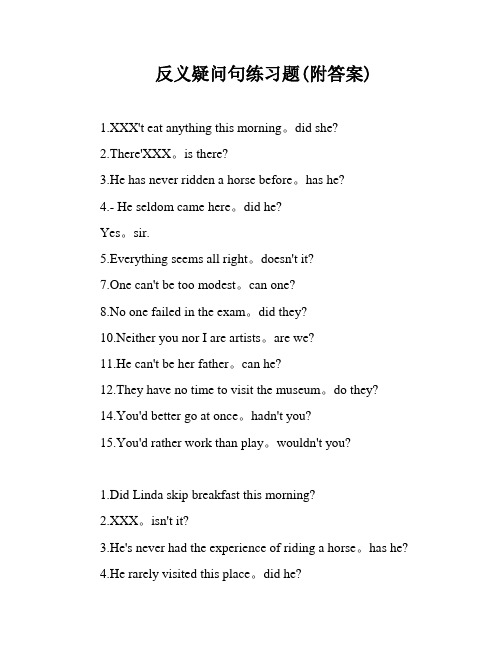
反义疑问句练习题(附答案)1.XXX't eat anything this morning。
did she?2.There'XXX。
is there?3.He has never ridden a horse before。
has he?4.- He seldom came here。
did he?Yes。
sir.5.Everything seems all right。
doesn't it?7.One can't be too modest。
can one?8.No one failed in the exam。
did they?10.Neither you nor I are artists。
are we?11.He can't be her father。
can he?12.They have no time to visit the museum。
do they?14.You'd better go at once。
hadn't you?15.You'd rather work than play。
wouldn't you?1.Did Linda skip breakfast this morning?2.XXX。
isn't it?3.He's never had the experience of riding a horse。
has he?4.He rarely visited this place。
did he?5.It seems like everything is fine。
isn't it?7.It'XXX。
isn't it?8.Everyone passed the exam。
right?10.We're both not artists。
are we?11.XXX father。
小升初英语反意疑问句练习题20题带答案解析
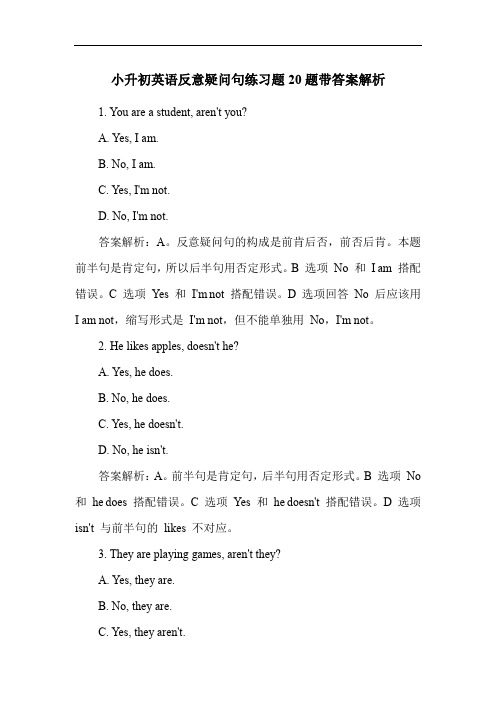
小升初英语反意疑问句练习题20题带答案解析1. You are a student, aren't you?A. Yes, I am.B. No, I am.C. Yes, I'm not.D. No, I'm not.答案解析:A。
反意疑问句的构成是前肯后否,前否后肯。
本题前半句是肯定句,所以后半句用否定形式。
B 选项No 和I am 搭配错误。
C 选项Yes 和I'm not 搭配错误。
D 选项回答No 后应该用I am not,缩写形式是I'm not,但不能单独用No,I'm not。
2. He likes apples, doesn't he?A. Yes, he does.B. No, he does.C. Yes, he doesn't.D. No, he isn't.答案解析:A。
前半句是肯定句,后半句用否定形式。
B 选项No 和he does 搭配错误。
C 选项Yes 和he doesn't 搭配错误。
D 选项isn't 与前半句的likes 不对应。
3. They are playing games, aren't they?A. Yes, they are.B. No, they are.C. Yes, they aren't.D. No, they isn't.答案解析:A。
前半句是肯定句,后半句用否定形式。
B 选项No 和they are 搭配错误。
C 选项Yes 和they aren't 搭配错误。
D 选项they 后面应该用are,不是isn't。
4. She can swim, can't she?A. Yes, she can.B. No, she can.C. Yes, she can't.D. No, she isn't.答案解析:A。
六年级英语反义疑问句练习题30题(带答案)
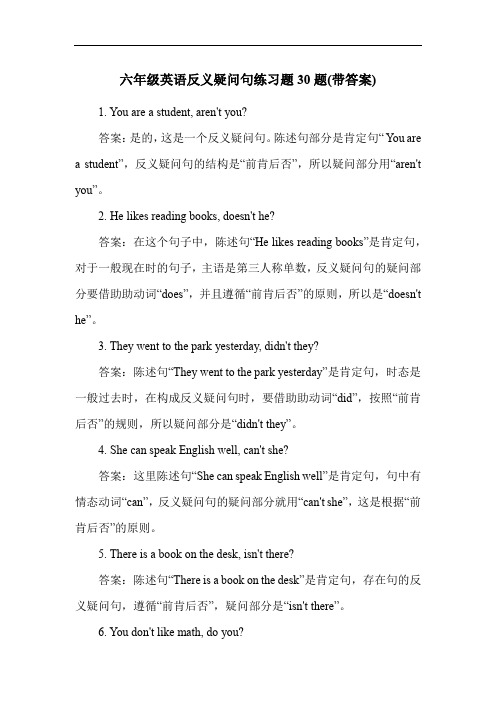
六年级英语反义疑问句练习题30题(带答案)1. You are a student, aren't you?答案:是的,这是一个反义疑问句。
陈述句部分是肯定句“ You are a student”,反义疑问句的结构是“前肯后否”,所以疑问部分用“aren't you”。
2. He likes reading books, doesn't he?答案:在这个句子中,陈述句“He likes reading books”是肯定句,对于一般现在时的句子,主语是第三人称单数,反义疑问句的疑问部分要借助助动词“does”,并且遵循“前肯后否”的原则,所以是“doesn't he”。
3. They went to the park yesterday, didn't they?答案:陈述句“They went to the park yesterday”是肯定句,时态是一般过去时,在构成反义疑问句时,要借助助动词“did”,按照“前肯后否”的规则,所以疑问部分是“didn't they”。
4. She can speak English well, can't she?答案:这里陈述句“She can speak English well”是肯定句,句中有情态动词“can”,反义疑问句的疑问部分就用“can't she”,这是根据“前肯后否”的原则。
5. There is a book on the desk, isn't there?答案:陈述句“There is a book on the desk”是肯定句,存在句的反义疑问句,遵循“前肯后否”,疑问部分是“isn't there”。
6. You don't like math, do you?答案:陈述句“You don't like math”是否定句,反义疑问句的结构是“前否后肯”,所以疑问部分是“do you”。
小升初英语反意疑问句练习题30题
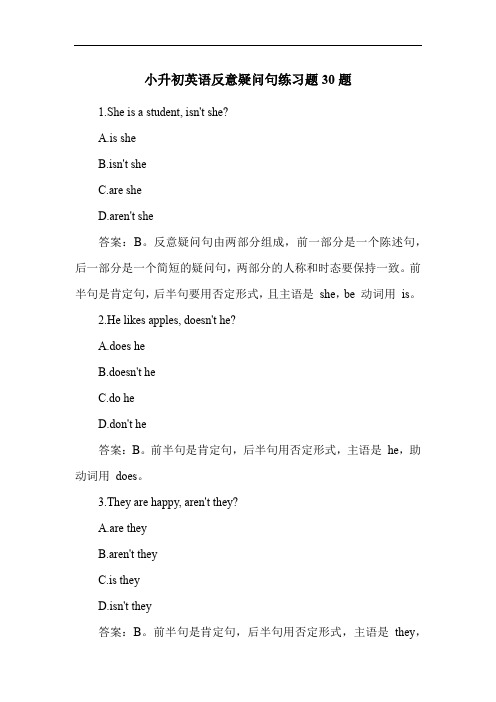
小升初英语反意疑问句练习题30题1.She is a student, isn't she?A.is sheB.isn't sheC.are sheD.aren't she答案:B。
反意疑问句由两部分组成,前一部分是一个陈述句,后一部分是一个简短的疑问句,两部分的人称和时态要保持一致。
前半句是肯定句,后半句要用否定形式,且主语是she,be 动词用is。
2.He likes apples, doesn't he?A.does heB.doesn't heC.do heD.don't he答案:B。
前半句是肯定句,后半句用否定形式,主语是he,助动词用does。
3.They are happy, aren't they?A.are theyB.aren't theyC.is theyD.isn't they答案:B。
前半句是肯定句,后半句用否定形式,主语是they,be 动词用are。
4.You are a teacher, aren't you?A.are youB.aren't youC.is youD.isn't you答案:B。
前半句是肯定句,后半句用否定形式,主语是you,be 动词用are。
5.We have a book, don't we?A.do weB.don't weC.does weD.doesn't we答案:B。
前半句是肯定句,后半句用否定形式,主语是we,助动词用do。
6.She can swim, can't she?A.can sheB.can't sheC.could sheD.couldn't she答案:B。
前半句是肯定句,后半句用否定形式,主语是she,情态动词用can。
7.He will come, won't he?A.will heB.won't heC.would heD.wouldn't he答案:B。
初中反义疑问句专练及答案
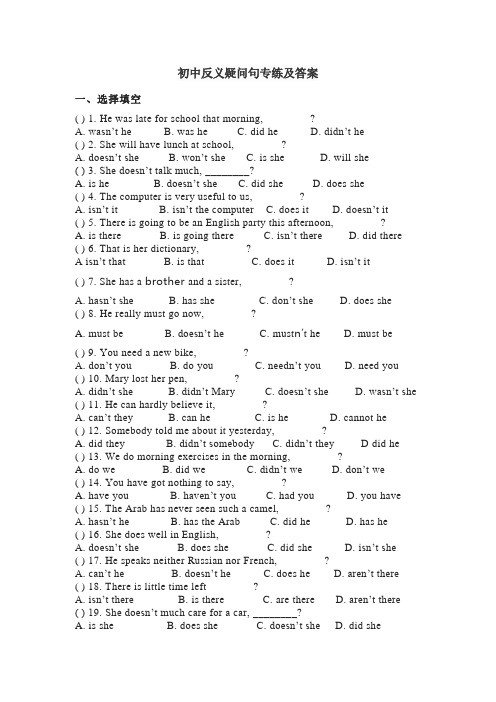
初中反义疑问句专练及答案一、选择填空( ) 1. He was late for school that morning, ________?A. wasn’t heB. was heC. did heD. didn’t he( ) 2. She will have lunch at school, ________?A. doesn’t sheB. won’t sheC. is sheD. will she( ) 3. She doesn’t talk much, ________?A. is heB. doesn’t sheC. did sheD. does she( ) 4. The computer is very useful to us, ________?A. isn’t itB. isn’t the computerC. does itD. d oesn’t it ( ) 5. There is going to be an English party this afternoon, ________?A. is thereB. is going thereC. isn’t thereD. did there ( ) 6. That is her dictionary, ________?A isn’t that B. is that C. does it D. isn’t it( ) 7. She has a brother and a sister, ________?A. hasn’t sheB. has sheC. don’t sheD. does she ( ) 8. He really must go now, ________?A. must beB. doesn’t heC. must n’t heD. must be ( ) 9. You need a new bike, ________?A. don’t youB. do youC. needn’t youD. need you ( ) 10. Mary lost her pen, ________?A. didn’t sheB. didn’t MaryC. doesn’t sheD. wasn’t s he ( ) 11. He can hardly believe it, ________?A. can’t theyB. can heC. is heD. cannot he ( ) 12. Somebody told me about it yesterday, ________?A. did theyB. didn’t somebodyC. didn’t they D did he ( ) 13. We do morning exercises in the morning, ________?A. do weB. did weC. didn’t weD. don’t we ( ) 14. You have got nothing to say, ________?A. have youB. haven’t youC. had youD. you have ( ) 15. The Arab has never seen such a camel, ________?A. hasn’t heB. has the ArabC. did heD. has he ( ) 16. She does well in English, ________?A. doesn’t sheB. does sheC. did sheD. isn’t she ( ) 17. He speaks neither Russian nor French, ________?A. can’t heB. doesn’t heC. does heD. aren’t there ( ) 18. There is little time left ________?A. isn’t thereB. is thereC. are thereD. aren’t there ( ) 19. She doesn’t much care for a car, ________?A. is sheB. does sheC. doesn’t sheD. did she( ) 20. Somebody borrowed my bike yesterday, ________?A. didn’t theyB. did theyC. did heD. doesn’t he ( ) 21. There aren’t thirty days in February, are they? No, _______.A. there areB. there aren’tC. there doD. there don’t ( ) 22. You don’t think so, ________?A. don’t youB. aren’t youC. are youD. aren’t you ( ) 23. They have never been to the Summer Palace, ________?A. have theyB. haven’t youC. don’t youD. aren’t you ( ) 24. Kate’s father will go to London for his holiday, ________?A. won’t heB. will heC. doesn’t heD. isn’t he ( ) 25. My daughter wants to learn popular music, ________?A. doesn’t sheB. isn’t sheC. does sheD. will she ( ) 26. Your father can speak German, ________?A. does heB. is heC. doesn’t heD. can’t he ( ) 27. You were at school last year, ________?A. were youB. did youC. weren’t youD. didn’t you ( ) 28. You’d better go shopping with her, ________?A. didn’t youB. don’t youC. hadn’t youD. haven’t you ( ) 29. None of us liked her lessons, ________?A. do weB. did weC. don’t weD. didn’t we( ) 30. He can’t do what she said, ________?A. does heB. can’t sheC. can ID. can he( ) 31. I don’t think he can finish the work, ________?A. do IB. does heC. can ID. can be( ) 32. Let us have a rest, ________?A. will youB. shall weC. do youD. don’t we( ) 33. What a nice girl, ________?A. isn’t itB. isn’t sheC. doesn’t itD. does it( ) 34. Most of the money has been spent, ________?A. have theyB. haven’t theyC. has itD. hasn’t it( ) 35. Do come to see me, ________?A. don’t youB. can’t youC. will youD. won’t you ( ) 36. I’m the first, ________?A. am not IB. aren’t IC. be ID. do I( ) 37. No one knew the truth, ________?A. don’t theyB. didn’t theyC. does heD. did they( ) 38. The girl is unhappy, ________?A. is sheB. does sheC. isn’t sheD. doesn’t she ( ) 39. Don’t be careless, ________?A. do youB. can youC. will youD. are you ( ) 40. He must be very tired, ________?A. mustn’t youB. isn’t heC. were theyD. do they ( ) 41. Few people were late yesterday, ________?A. weren’t theyB. wasn’t heC. were theyD. do they ( ) 42. Don’t do that again, ________?A. shall youB. would youC. can’t youD. will you二、把下列句子变成反意疑问句1.They aren’t students ________?2.There is a book on the table, ________?3.His brother is a solider, ________?4.Lucy and her parents will come to China, ________?5.My daughter can’t swim, ________?6.Li Lei lives in this city, ________?7.They watched TV last Sunday, ________?8.He has never been to New York, ________?9.She knows little about English, ________?10.There is nothing in the room, ________?11.Nobody came to see him, ________?12.Nothing can stop him from going there, ________?13.Let’s go to school, ________?14.I don’t believe she knows it, ________?15.He never said he could come, ________?16.You have no classes on Sunday, ________?17.Dogs can run faster than hens, ________?18.You need a new bike, ________?19.He speaks neither English nor fepanese, ________?20.He can hardly believe it, ________?21.There is little time left, ________?22.You haven’t seen my book anywhere, ________?23.His son doesn’t learn English, ________?24.Nobody can do this work, ________?25.This is an interesting film, ________?26.Let’s go out for a picnic, ________?27.Don’t close the door, ________?28.They were doing their homework this time yesterday, ________?29.The boys began to play football, ________?30.The birds have flown away, ________?参考答案:一、1. A 2. B 3. D 4. A 5. C 6. D 7. A 8. A 9. A 10. A11. B 12. C 13. D 14. A 15. B 16. A 17. C 18. B 19. B 20. A 21. B 22. D 23. A 24. A 25. D26. D 27. C 28. C 29. B 30. C31. D 32. A 33. B 34. D 35. C 36. B 37. D 38. C 39. C 40. C 42. D二、1. are they 2. isn’t there 3. isn’t he 4. won’t they 5. can she6. doesn’t she7. didn’t they8. has he9. does she 10. is there11. did they 12. can it 13. shall we 14. does she 15. did he16. do you 17. can’t they 18. don’t you 19.doesn’t he 20. can he21. is there 22. have you 23. does he 24. can they 25. isn’t it26. will you 27. will you 28. weren’t they 29. didn’t they 30. haven’t they。
四年级英语反义疑问句练习题30题(答案解析)

四年级英语反义疑问句练习题30题(答案解析)1. You are a student, aren't you?答案解析:这是一个be动词(are)引导的反义疑问句。
反义疑问句的构成规则是:前半句是肯定陈述句,后半句则用否定的简短问句。
前半句“You are a student”是肯定句,所以后半句用“aren't you”。
2. He is a good boy, isn't he?答案解析:此题为be动词(is)引导的反义疑问句。
根据规则,前句为肯定陈述,后句要用否定疑问形式。
这里前半句“He is a good boy”是肯定的,所以后面是“isn't he”。
3. She was at school yesterday, wasn't she?答案解析:这是be动词((was)引导的反义疑问句。
由于前半句“She was at school yesterday”是肯定句,反义疑问句的后半句就要用否定形式“wasn't she”,这是遵循前肯后否的原则。
4. They like apples, don't they?答案解析:这里是助动词((do)引导的反义疑问句。
因为前半句“They like apples”是一般现在时的肯定陈述句,且句中的动词“like”是实义动词,所以反义疑问句的后半句要用助动词do的否定形式“don't they”。
5. We have a new book, don't we?答案解析:这是助动词((do)引导的反义疑问句。
前半句“We have a new book”是一般现在时的肯定句,其中“have”在这里是实义动词,按照规则,后半句要用助动词do的否定形式“don't we”。
6. Tom can swim, can't he?答案解析:这是情态动词((can)引导的反义疑问句。
四年级英语反义疑问句练习题30题带答案

四年级英语反义疑问句练习题30题带答案1. He is a student, isn't he?答案:是。
解析:在这个反义疑问句中,前面的陈述部分“He is a student”是肯定句,根据反义疑问句的规则,肯定句后面的疑问部分要用否定形式,所以是“isn't he”。
这里be动词是is,疑问部分就将is变为否定形式isn't,然后加上主语he。
2. She is happy, isn't she?答案:是。
解析:陈述部分“She is happy”为肯定句,按照规则,反义疑问句的疑问部分要用否定形式。
be动词是is,否定形式为isn't,再加上主语she。
3. It is a cat, isn't it?答案:是。
解析:前面陈述部分“It is a cat”是肯定句,对于这种以be动词is构成的肯定句,反义疑问句的疑问部分为否定形式,即把is变为isn't,再加上主语it。
4. You are a good boy, aren't you?答案:是。
解析:陈述部分“You are a good boy”是肯定句,由于be动词是are,所以反义疑问句的疑问部分为否定形式aren't,再加上主语you。
5. They are at home, aren't they?答案:是。
解析:陈述部分“They are at home”是肯定句,be动词为are,根据反义疑问句的规则,疑问部分为否定形式aren't,再加上主语they。
6. He is my father, isn't he?答案:是。
解析:陈述部分“He is my father”为肯定句,be动词是is,反义疑问句的疑问部分为否定形式isn't,再加上主语he。
7. She is in the classroom, isn't she?答案:是。
初三英语反义疑问句试题答案及解析
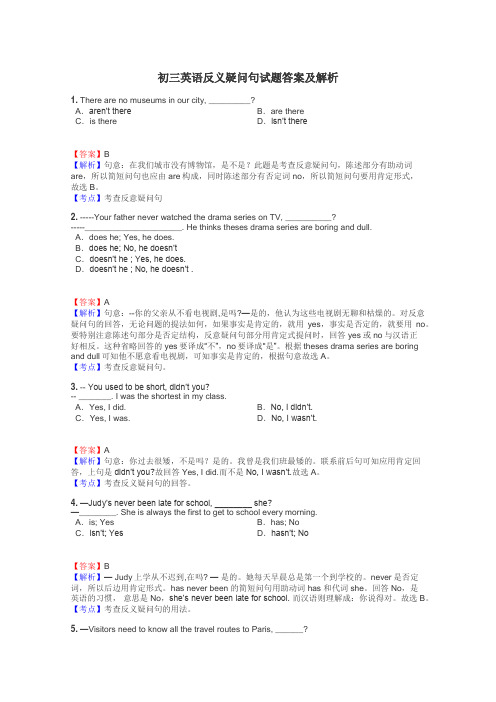
初三英语反义疑问句试题答案及解析1. There are no museums in our city, _________?A.aren’t there B.are thereC.is there D.isn’t there【答案】B【解析】句意:在我们城市没有博物馆,是不是?此题是考查反意疑问句,陈述部分有助动词are,所以简短问句也应由are构成,同时陈述部分有否定词no,所以简短问句要用肯定形式,故选B。
【考点】考查反意疑问句2. -----Your father never watched the drama series on TV, __________?-----_____________________. He thinks theses drama series are boring and dull.A.does he; Yes, he does.B.does he; No, he doesn’tC.doesn’t he ; Yes, he does.D.doesn’t he ; No, he doesn’t .【答案】A【解析】句意:--你的父亲从不看电视剧,是吗?—是的,他认为这些电视剧无聊和枯燥的。
对反意疑问句的回答,无论问题的提法如何,如果事实是肯定的,就用yes,事实是否定的,就要用no。
要特别注意陈述句部分是否定结构,反意疑问句部分用肯定式提问时,回答yes或no与汉语正好相反。
这种省略回答的yes要译成“不”,no要译成“是”。
根据theses drama series are boring and dull可知他不愿意看电视剧,可知事实是肯定的,根据句意故选A。
【考点】考查反意疑问句。
3. -- You used to be short, didn’t you?-- _______. I was the shortest in my class.A.Yes, I did.B.No, I didn’t.C.Yes, I was.D.No, I wasn’t.【答案】A【解析】句意:你过去很矮,不是吗?是的。
初、高中反义疑问句全解(含测试题)
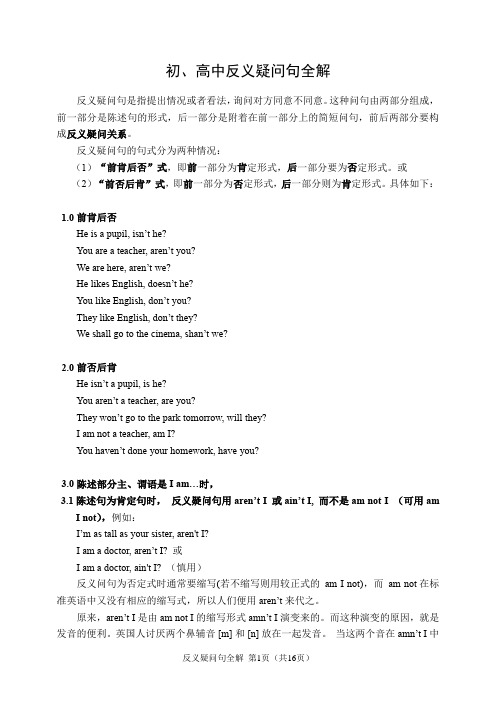
初、高中反义疑问句全解反义疑问句是指提出情况或者看法,询问对方同意不同意。
这种问句由两部分组成,前一部分是陈述句的形式,后一部分是附着在前一部分上的简短问句,前后两部分要构成反义疑问关系。
反义疑问句的句式分为两种情况:(1)“前肯后否”式,即前一部分为肯定形式,后一部分要为否定形式。
或(2)“前否后肯”式,即前一部分为否定形式,后一部分则为肯定形式。
具体如下:1.0前肯后否He is a pupil, isn’t he?You are a teacher, aren’t you?We are here, aren’t we?He likes English, doesn’t he?You like English, don’t you?They like English, don’t they?We shall go to the cinema, shan’t we?2.0前否后肯He isn’t a pupil, is he?You aren’t a teacher, are you?They won’t go to the park tomorrow, will they?I am not a teacher, am I?You haven’t done your homework, have you?3.0陈述部分主、谓语是I am…时,3.1陈述句为肯定句时,反义疑问句用aren’t I 或ain’t I, 而不是am not I (可用amI not),例如:I’m as tall as your sister, aren't I?I am a doctor, aren’t I? 或I am a doctor, ain't I? (慎用)反义问句为否定式时通常要缩写(若不缩写则用较正式的am I not),而am not在标准英语中又没有相应的缩写式,所以人们便用aren’t来代之。
小升初英语反意疑问句练习题20题含答案解析

小升初英语反意疑问句练习题20题含答案解析1.She is a good student, isn't she?A.is sheB.isn't sheC.does sheD.doesn't she答案解析:B。
反意疑问句遵循前肯后否或前否后肯的原则。
本题中前面是肯定句,后面要用否定形式,且前面句子中有be 动词is,所以后面用isn't she。
A 选项是肯定形式错误;C 和D 选项中助动词does 与前面句子的be 动词不对应,错误。
2.They like playing football, don't they?A.do theyB.don't theyC.are theyD.aren't they答案解析:B。
前面是肯定句,后面用否定形式,前面句子中有实义动词like,且主语是they,所以后面用don't they。
A 选项肯定形式错误;C 和 D 选项中be 动词与前面句子的实义动词不对应,错误。
3.He goes to school by bike, doesn't he?A.does heB.doesn't heC.is heD.isn't he答案解析:B。
前面是肯定句,后面用否定形式,前面句子中有实义动词goes,且主语是he,所以后面用doesn't he。
A 选项肯定形式错误;C 和D 选项中be 动词与前面句子的实义动词不对应,错误。
4.We are happy, aren't we?A.are weB.aren't weC.do weD.don't we答案解析:B。
前面是肯定句,后面用否定形式,前面句子中有be 动词are,所以后面用aren't we。
A 选项肯定形式错误;C 和D 选项中助动词与前面句子的be 动词不对应,错误。
5.Mom is cooking dinner, isn't she?A.is sheB.isn't sheC.does sheD.doesn't she答案解析:B。
中考英语反意疑问句练习题20题(答案解析)

中考英语反意疑问句练习题20题(答案解析)1.He likes playing basketball, doesn't he?A.does heB.is heC.doesn't he答案解析:C。
反意疑问句的构成规则是前肯后否,前否后肯。
本题中前面是肯定句,所以后面用否定形式doesn't he。
A 选项与前面重复,B 选项be 动词与前面不一致。
2.She is a good student, isn't she?A.is sheB.isn't sheC.are she答案解析:B。
前肯后否,前面是肯定句,后面用否定形式isn't she。
A 选项与前面重复,C 选项be 动词与前面不一致。
3.They went to the park yesterday, didn't they?A.did theyB.didn't theyC.do they答案解析:B。
前肯后否,前面是过去式的肯定句,后面用过去式的否定形式didn't they。
A 选项与前面重复,C 选项时态不一致。
4.There is a book on the table, isn't there?A.is thereB.isn't thereC.are there答案解析:B。
前肯后否,前面是there be 句型的肯定句,后面用there be 句型的否定形式isn't there。
A 选项与前面重复,C 选项be 动词与前面不一致。
5.He can swim well, can't he?A.can heB.can't heC.does he答案解析:B。
前肯后否,前面是肯定句,后面用否定形式can't he。
A 选项与前面重复,C 选项助动词与前面不一致。
6.She has a pen, doesn't she?A.does sheB.doesn't sheC.has she答案解析:B。
初中英语反意疑问句单项选择题70题
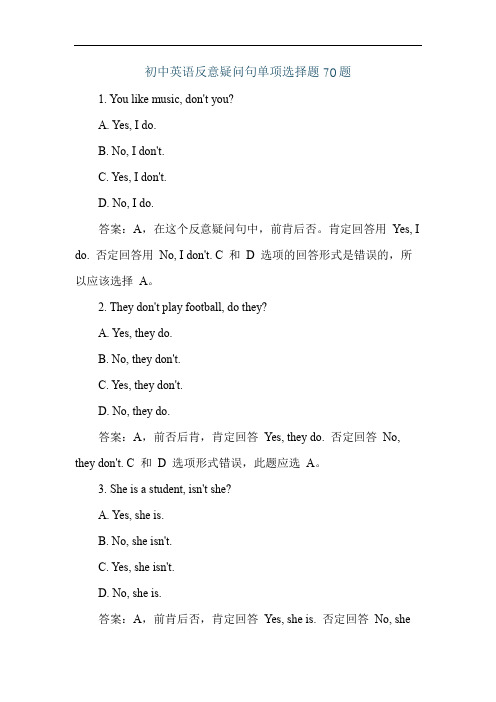
初中英语反意疑问句单项选择题70题1. You like music, don't you?A. Yes, I do.B. No, I don't.C. Yes, I don't.D. No, I do.答案:A,在这个反意疑问句中,前肯后否。
肯定回答用Yes, I do. 否定回答用No, I don't. C 和D 选项的回答形式是错误的,所以应该选择A。
2. They don't play football, do they?A. Yes, they do.B. No, they don't.C. Yes, they don't.D. No, they do.答案:A,前否后肯,肯定回答Yes, they do. 否定回答No, they don't. C 和D 选项形式错误,此题应选A。
3. She is a student, isn't she?A. Yes, she is.B. No, she isn't.C. Yes, she isn't.D. No, she is.答案:A,前肯后否,肯定回答Yes, she is. 否定回答No, sheisn't. C 和D 选项形式不对,答案选A。
4. He can swim, can't he?A. Yes, he can.B. No, he can't.C. Yes, he can't.D. No, he can.答案:A,前肯后否,肯定回答Yes, he can. 否定回答No, he can't. C 和D 选项错误,选A。
5. We have lunch at school, don't we?A. Yes, we do.B. No, we don't.C. Yes, we don't.D. No, we do.答案:A,前肯后否,A 选项Yes, we do. 是肯定回答,B 选项No, we don't. 是否定回答,C 和D 选项形式错误,此题选A。
五年级英语反义疑问句练习题20题(带答案)

五年级英语反义疑问句练习题20题(带答案)1. He is a good student, isn't he?答案:是的,他是。
因为前面是肯定句,反义疑问句部分为否定形式。
这里遵循“前肯后否”的原则,回答时如果事实是肯定的,就用Yes,he is。
2. She can sing well, can't she?答案:是的,她能。
前面是肯定句,反义疑问句部分为否定形式。
按照规则,若实际情况是肯定的,就回答Yes, she can。
3. They like playing football, don't they?答案:是的,他们喜欢。
这是肯定陈述句,反义疑问句部分为否定。
当实际情况是肯定时,回答为Yes, they do。
4. It was a beautiful day yesterday, wasn't it?答案:是的,昨天是。
前面为肯定句,反义疑问句为否定形式。
若事实是肯定的,回答是Yes, it was。
5. You have a sister, don't you?答案:是的,我有。
对于这种肯定陈述句后的反义疑问句,当实际情况为肯定时,回答为Yes, I do。
6. He doesn't like apples, does he?答案:是的,他不喜欢。
前面是否定句,反义疑问句部分为肯定形式。
如果实际情况是否定的,就回答Yes, he doesn't。
7. She isn't at home now, is she?答案:是的,她不在。
由于前面是否定句,反义疑问句为肯定形式。
当事实是否定时,回答为Yes, she isn't。
8. They didn't go to school yesterday, did they?答案:是的,他们没去。
前面是否定句,反义疑问句为肯定形式。
若实际情况是否定的,回答是Yes, they didn't。
四年级英语反义疑问句练习题30题(答案解析)

四年级英语反义疑问句练习题30题(答案解析)1. You are a student, aren't you?A. am IB. are youC. aren't ID. am not I答案解析:本题考查反义疑问句的构成规则。
反义疑问句由两部分组成,前一部分是陈述句,后一部分是简短的疑问句,且前后两部分的人称和时态要一致。
在本题中,前一部分是“You are a student”,后一部分应该是“aren't you”。
选项A“am I”人称不一致;选项B“are you”与前一部分重复;选项C“aren't I”在口语中可以使用,但在正式场合中一般用“aren't you”;选项D“am not I”比较正式,但不常用。
所以正确答案是aren't you。
2. She likes apples, doesn't she?A. does sheB. doesn't sheC. is sheD. isn't she答案解析:本题中,前一部分是“She likes apples”,后一部分应该是“doesn't she”。
选项A“does she”与前一部分重复;选项C“is she”时态和动词不一致;选项D“isn't she”动词不一致。
所以正确答案是doesn't she。
3. He is tall, isn't he?A. is heB. isn't heC. are heD. am he答案解析:前一部分是“He is tall”,后一部分应为“isn't he”。
选项A“is he”与前一部分重复;选项C“are he”人称和动词不一致;选项D“am he”人称和动词不一致。
正确答案是isn't he。
4. They play football, don't they?A. do theyB. don't theyC. are theyD. aren't they答案解析:前一部分是“They play football”,后一部分是“don't they”。
(完整版)反义疑问句练习题(附答案)
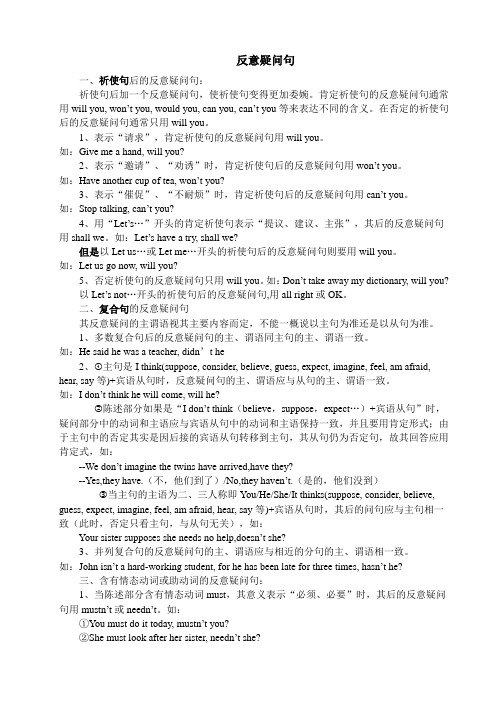
反意疑问句一、祈使句后的反意疑问句:祈使句后加一个反意疑问句,使祈使句变得更加委婉。
肯定祈使句的反意疑问句通常用will you, won’t you, would you, can you, can’t you等来表达不同的含义。
在否定的祈使句后的反意疑问句通常只用will you。
1、表示“请求”,肯定祈使句的反意疑问句用will you。
如:Give me a hand, will you?2、表示“邀请”、“劝诱”时,肯定祈使句后的反意疑问句用won’t you。
如:Have another cup of tea, won’t you?3、表示“催促”、“不耐烦”时,肯定祈使句后的反意疑问句用can’t you。
如:Stop talking, can’t you?4、用“Let’s…”开头的肯定祈使句表示“提议、建议、主张”,其后的反意疑问句用shall we。
如:Let’s have a try, shall we?但是以Let us…或Let me…开头的祈使句后的反意疑问句则要用will you。
如:Let us go now, will you?5、否定祈使句的反意疑问句只用will you。
如:Don’t take away my dictionary, will you?以Let’s not…开头的祈使句后的反意疑问句,用all right或OK。
二、复合句的反意疑问句其反意疑问的主谓语视其主要内容而定,不能一概说以主句为准还是以从句为准。
1、多数复合句后的反意疑问句的主、谓语同主句的主、谓语一致。
如:He said he was a teacher, didn’t he2、①主句是I think(suppose, consider, believe, guess, expect, imagine, feel, am afraid, hear, say等)+宾语从句时,反意疑问句的主、谓语应与从句的主、谓语一致。
四年级英语反义疑问句练习题30题含答案解析

四年级英语反义疑问句练习题30题含答案解析1.She is a student, isn't she?Yes, she is. 本题考查be 动词的反义疑问句。
前半句是肯定句,be 动词是is,所以后半句用isn't she。
2.They are in the classroom, aren't they?Yes, they are. 前半句是肯定句,be 动词是are,反义疑问句用aren't they。
3.He is a teacher, isn't he?Yes, he is. 肯定句中be 动词是is,反义疑问句用isn't he。
4.We are friends, aren't we?Yes, we are. 肯定句be 动词是are,反义疑问句用aren't we。
5.The book is on the desk, isn't it?Yes, it is. 肯定句be 动词是is,反义疑问句用isn't it。
6.She is happy, isn't she?Yes, she is. 肯定句be 动词是is,反义疑问句用isn't she。
7.They are playing games, aren't they?Yes, they are. 肯定句be 动词是are,反义疑问句用aren't they。
8.He is reading a book, isn't he?Yes, he is. 肯定句be 动词是is,反义疑问句用isn't he。
9.We are having lunch, aren't we?Yes, we are. 肯定句be 动词是are,反义疑问句用aren't we。
10.The girl is singing, isn't she?Yes, she is. 肯定句be 动词是is,反义疑问句用isn't she。
初中反义疑问句的专项训练以及答案精讲
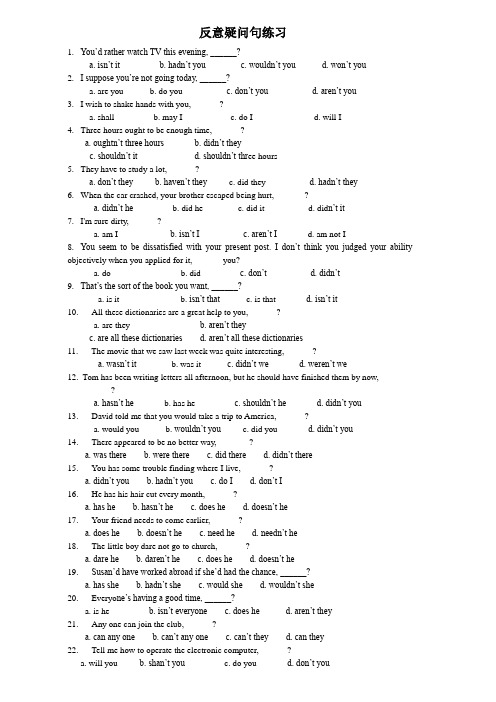
反意疑问句练习1. Y ou’d rather watch TV this evening, ______?a. isn’t itb. hadn’t youc. wouldn’t youd. won’t you2. I suppose you’re not going today, ______?a. are youb. do youc. don’t youd. aren’t you3. I wish to shake hands with you, ______?a. shallb. may Ic. do Id. will I4. Three hours ought to be enough time, ______?a. oughtn’t three hoursb. didn’t theyc. shouldn’t itd. shouldn’t thr ee hours5. They have to study a lot, ______?a. don’t theyb. haven’t theyc. did theyd. hadn’t they6. When the car crashed, your brother escaped being hurt, ______ ?a. didn’t heb. did hec. did itd. did n’t it7. I'm sure dirty, ______?a. am Ib. isn’t Ic. aren’t Id. am not I8. Y ou seem to be dissatisfied with your present post. I don’t think you judged your ability objectively when you applied for it, ______ you?a. dob. didc. don’td. didn’t9. That’s the sort of the book you want, ______?a. is itb. isn’t thatc. is thatd. isn’t it10. All these dictionaries are a great help to you, ______?a. are theyb. aren’t theyc. are all these dictionariesd. aren’t all these dictionaries11. The movie that we saw last week was quite interesting, ______?a. wasn’t itb. was itc. didn’t wed. weren’t we12. Tom has been writing letters all afternoon, but he should have finished them by now,______?a. hasn’t heb. has hec. shouldn’t hed. didn’t you13. David told me that you would take a trip to America, ______?a. would youb. wouldn’t youc. did youd. didn’t you14. There appeared to be no better way, _______?a. was thereb. were therec. did thered. didn’t there15. Y ou has some trouble finding where I live, ______?a. didn’t youb. hadn’t youc. do Id. don’t I16. He has his hair cut every month, ______?a. has heb. hasn’t hec. does hed. doesn’t he17. Y our friend needs to come earlier, ______?a. does heb. doesn’t hec. need hed. needn’t he18. The little boy dare not go to church, ______?a. dare heb. daren’t hec. does hed. doesn’t he19. Susan’d have worked abroad if she’d had the chance, ______?a. has sheb. hadn’t shec. would shed. wouldn’t she20. Everyo ne’s having a good time, ______?a. is heb. isn’t everyonec. does hed. aren’t they21. Any one can join the club, ______?a. can any oneb. can’t any onec. can’t theyd. can they22. Tell me how to operate the electronic computer, ______?a. will youb. shan’t youc. do youd. don’t you23. Magaret scarcely comes to visit you on Christmas Day, ______?a. doesn’t sheb. does shec. do youd. don’t you24. Let’s listen to the radio program that the teacher mentioned, ______?a. do web. don’t wec. shall wed. shan’t we25. Y ou think you’re funny, ______?a. didn’t youb. are youc. don’t youd. do you26. Janet used to take part in labor in that village, ______?a. used sheb. did shec. didn’t shed. should she27. What beautiful weather, ______?a. is itb. isn’t itc. won’t itd. doesn’t it28. He ought to go to Kwangchow by plane, ______?a. should heb. shouldn’t hec. would hed. wouldn’t he29. We never dared to ask him a question, ______?a. did web. didn’t wec. dared wed. daren’t we30. Nobody will believe how difficult his work has been ______?a. will heb. won’t nobodyc. will theyd. won’t they31. Y ou must have made the mistake, ______?a. mustn’t youb. haven’t youc. didn’t youd. hadn’t you32. Learning how to repair computers takes a long time, ______?a. isn’t itb. aren’t theyc. doesn’t itd. don’t they33. Jack has coffee with breakfast, ______?a. hasn’t Jackb. hasn’t hec. doesn’t Jackd. doesn’t he34. They must have stayed at hotel last night, ______?a. mustn’t theyb. haven’t theyc. didn’t theyd. hadn’t they35. There isn’t anything wrong with the radio, ______?a. is thereb. is itc. does itd. does there36. Y ou must be hungry, ______?a. must youb. mustn’t youc. are youd. aren’t you37. Let’s do the exercises by ourselves, ______?a. shall web. shan’t wec. will youd. will we38. Her daughter had the carpets and curtains cleaned, ______?a. had sheb. hadn’t shec. didn’t shed. didn’t her daughter39. The teacher had a talk with you, ______?a. has youb. hadn’t shec. did shed. didn’t she40. Something’ll have to be done about the air pollution, ______?a. won’t itb. will itc. has itd. does it反义疑问句(二)1、Few of them hurt themselves in the accident last night,________A. don’t theyB. didn’t theyC. did theyD. do they2、-Y ou’ve never seen dinosaur eggs, have you ?--_____. How I wish to visit the Dinosaur World.A. Yes, I haveB. No, I haven’tC. Certainly, I haveD. Of course, I haven’t3、His sister had a bad cough, ______she?A. wasn’tB. doesn’tC. hadn’tD. didn’t4、Mr. Green went to Shenzhen on business last week,________?A. isn’t heB. doesn’t heC. didn’t heD. hasn’t he5、ohn can hardly understand any Chinese, _________he?A. Can’tB. doesn’tC. canD. does6、Don’t smoke in the meeting-room,_________?A. do youB. will youC. can youD. could you7、Lucy, you clean the blackboard today,_______A. do youB. did youC. will youD. can you8、Miss Cheng will never forget her first visit to Canada ,________?A. will sheB. won’t sheC. isn’t she D wasn’t she9、The lady couldn’t say a word when she saw the snake,________?A. could the ladyB. couldn’t the ladyC. could sheD. couldn’t she反义疑问句(三)1. Y ou are an actor, ________ _____ ?2. He is a good boy, ________ ______ ?3. It was fine yesterday, _______ ___ ?4. Y ou were studying when I called you last night, __________ _____ ?5. She is going to visit me, _____ ____?6. I am Chinese, ______you ?7. It often rains here, ________ ___ ?8. He likes soccer, _________ ____ ? 9. Y ou have a headache, _______ ___ ?10. I called you yesterday, _______ __? 11. Y ou will go to America, ______ ___ ?12. We have ever been to Shanghai, _________ ______ ?13. His mother is a doctor, ______ ____ ? 14. The dogs are fighting, _______ _____?15 There is a boy in our classroom, _______ _______ ?17. There were many cars in the street,_________ ________ ?18. There will be robots in our families,________ ______ ?19. Sit down please, _______________ ? 20. Please call me, _________________?21. Let’s go home,_________ ? 22. Let us go home, ________________ ?23 . Let me see, __________________ ?反义疑问句(四)1.My mom bought me a medium coke,_________?2.Y ou went to your grandma's home,__________?3.He will go home,________?4.She doesn't like to eat apples,_______?5.Y our room looks so big,_______?6.Y ou won't sleep early,_________?7.Y our are never late for school,___________?8.Y ou watched the football match last week,______?9.My mother is cooking,__________?10.Y our father plays the computer very well,__________?11.Y ou were moved by your students,________?12.Jogging makes us healthy,______________?13.The sewing machine can make the clothes,___________?14.My mother doesn't enjoy smoking,_________?15.Y ou don't want to bo a teacher in the future,________?16.Y ou look so happy today,________?Key:(一)1-5CABCA 6-10ACBDB反一11-15ACBDA 16-20DBADD21-25CABCD 26-30 C BBAC31-35BCDCA 36-40 DACDA(二)1-5CBDCC 6-10BCACD反二(三)1.aren't you2.isn't he3.wasn't it4.didn't you5.won't she6.aren't7.doesn't it8.doesn't he9.don't you 10.didn't you 11.won't you 12.haven't you 13.isn't she 14.aren't they 15.isn't there 17.weren'y there 18.won't there 19.will you 20.will you 21.shall we22.will you 23.will you(四)1. didn't she2. didn't you3. won't he4. does she5. doesn't it6. will you7. are you8. didn't you9. isn't she 10. doesn't he 11. weren't you 12. doesn't it 13.can't it 14. does she ...。
反义疑问句练习题
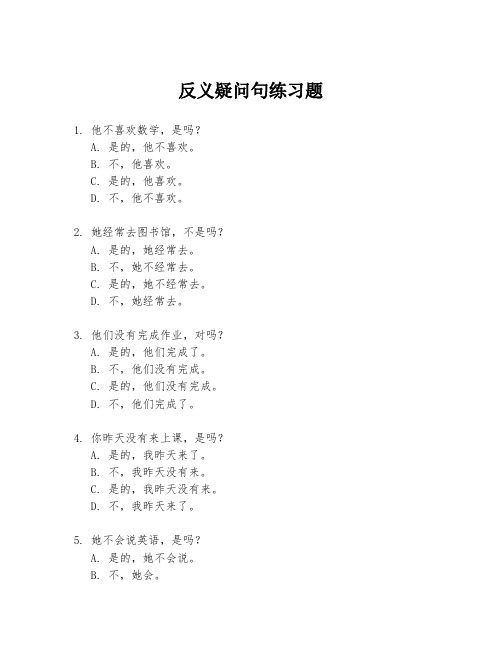
反义疑问句练习题1. 他不喜欢数学,是吗?A. 是的,他不喜欢。
B. 不,他喜欢。
C. 是的,他喜欢。
D. 不,他不喜欢。
2. 她经常去图书馆,不是吗?A. 是的,她经常去。
B. 不,她不经常去。
C. 是的,她不经常去。
D. 不,她经常去。
3. 他们没有完成作业,对吗?A. 是的,他们完成了。
B. 不,他们没有完成。
C. 是的,他们没有完成。
D. 不,他们完成了。
4. 你昨天没有来上课,是吗?A. 是的,我昨天来了。
B. 不,我昨天没有来。
C. 是的,我昨天没有来。
D. 不,我昨天来了。
5. 她不会说英语,是吗?A. 是的,她不会说。
B. 不,她会。
C. 是的,她会。
D. 不,她不会。
6. 他们明天会来参加聚会,不是吗?A. 是的,他们明天会来。
B. 不,他们明天不会来。
C. 是的,他们明天不会来。
D. 不,他们明天会来。
7. 你已经看过这部电影了,对吗?A. 是的,我已经看过了。
B. 不,我还没有看过。
C. 是的,我还没有看过。
D. 不,我已经看过了。
8. 他不是医生,是吗?A. 是的,他是医生。
B. 不,他不是医生。
C. 是的,他不是医生。
D. 不,他是医生。
9. 她没有参加昨天的会议,对吗?A. 是的,她参加了。
B. 不,她没有参加。
C. 是的,她没有参加。
D. 不,她参加了。
10. 他们不喜欢这个计划,不是吗?A. 是的,他们喜欢。
B. 不,他们不喜欢。
C. 是的,他们不喜欢。
D. 不,他们喜欢。
11. 你认识他,是吗?A. 是的,我认识。
B. 不,我不认识。
C. 是的,我不认识。
D. 不,我认识。
12. 他不是学生,对吗?A. 是的,他是学生。
B. 不,他不是学生。
C. 是的,他不是学生。
D. 不,他是学生。
13. 她没有迟到,是吗?A. 是的,她迟到了。
B. 不,她没有迟到。
C. 是的,她没有迟到。
D. 不,她迟到了。
14. 他们不会游泳,不是吗?A. 是的,他们会游泳。
B. 不,他们不会游泳。
- 1、下载文档前请自行甄别文档内容的完整性,平台不提供额外的编辑、内容补充、找答案等附加服务。
- 2、"仅部分预览"的文档,不可在线预览部分如存在完整性等问题,可反馈申请退款(可完整预览的文档不适用该条件!)。
- 3、如文档侵犯您的权益,请联系客服反馈,我们会尽快为您处理(人工客服工作时间:9:00-18:30)。
△反意疑问句测试△[每小题0.5分,共30小题;满分15分]得分:________1.A hibernating animal needs hardly any food all through the winter, ________?A.need it B.needn't itC.does it D.doesn't it答案C[前有hardly这样的半否定词,反意问句用肯定,此处的need为实义动词,所以选C。
]2.You never told us why you were late for the last meeting, ________?(2010·山西运城市高三调研测试(一)) A.weren't you B.didn't youC.were you D.did you答案D[前面是否定,后用肯定。
]3.Sarah had his washing machine repaired the day before yesterday, ________ she? A.hadn't B.didn'tC.hasn't D.wasn't it答案B[had作“让”解,后面的反意问句的谓语要用didn't的形式。
]4.It is love novels that Miss Williams enjoys reading, ________?A.doesn't she B.isn't itC.does she D.is it答案B[强调句后的反意问句的主谓需与that前面的主谓相一致。
] 5.What a beautiful city, ________?(2010·江苏南通市高三上学期期末调研考试) A.is it B.isn't itC.will it D.won't it答案B[陈述部分是what a beautiful city it is的省略。
]6.When the teacher speaks, we have to keep quiet, ________?A.mustn't we B.doesn't heC.weren't we D.don't we答案D[主从复合句的反意疑问句一般与主句一致,前面是have to时,其后的反意问句要用do的适当形式。
故选D。
]7.You needn't do that when your maid is here, ________?A.needn't you B.need youC.haven't you D.doesn't you答案B[此处need为情态动词。
]8.Alice, you pass me that bowl, ________?(2010·辽宁沈阳一中第九次月考) A.will she B.doesn't sheC.don't you D.will you答案D[这是一个祈使句,除let's外的祈使句,反意问句一般用will you。
] 9.I don't think what Ms.Huang said just now can be reasonable, ________?A.do we B.is itC.can we D.can she答案B[主句谓语是think, believe等词时,如果主语是第一人称I,问句部分一般应与从句的主谓相一致,从句的主语是what Ms.Huang said just now,反意疑问句的主语需用it。
]10.The girl daren't go farther when she saw the snake, ________?A.doesn't she B.dare sheC.dares she D.doesn't the girl答案B[dare此处为情态动词,选B项。
]11.Let's share this novel, ________?A.shall we B.will weC.shan't we D.will you答案A[Let's开头的祈使句,其后的反意问句一般用shall we。
]12.The old man used to fish, ________?A.usedn't he B.used heC.didn't she D.did he答案A[used to表“过去常常”,后面反意问句用didn't或usedn't均可,所以选A。
注:C项中的she 改为he就可选了。
]13.He can't have come back to his dormitory last night, ________ he?(2010·天津南开中学高三2月月考) A.did B.didn't C.has D.hasn't答案A[陈述部分是“情态动词+完成时”时,反意问句的谓语有用过去时的也有用完成时的,本题有时间状语last night所以只用过去时。
故选A。
] 14.Everything seems all right, ________?A.doesn't it B.isn't itC.hasn't it D.don't they答案A[陈述部分的主语是everything时,反意问句的主语用it。
所以选A。
] 15.You'd like some tea, ________?A.hadn't you B.wouldn't youC.had you D.would you答案B['d like是would like的缩写形式,其后反意问句的谓语用wouldn't。
] 16.No one is going to climb next week, ________?A.is she B.isn't heC.are they D.aren't they答案C[陈述部分的主语是no one时,反意问句用are they或is he均可。
] 17.She disagreed with me on the question I put forward at yesterday's meeting, ________?A.didn't she B.did sheC.did I D.didn't I答案A[陈述部分是主从复合句时,反意问句一般需与主句一致,有否定前(后)缀词时视为肯定,其后的反意问句用否定。
故选A。
]18.I don't suppose it is going to rain this afternoon, ________?A.do I B.don't IC.is it D.isn't it答案C[主句谓语是think, suppose,believe等词时(主语是第一人称I),问句需与从句的主谓一致。
]19.I wish you would have a good weekend, ________?(2010·湖南祁东育贤中学高三第二次模拟) A.don't I B.wouldn't youC.haven't you D.may I答案D[I wish表愿望,其后的反意问句习惯上用may I。
]20.I'm afraid she can't keep his word, ________?A.aren't I B.can't IC.isn't she D.can she答案D[I'm afraid可视为插入语,它不是句子的重心所在,反意问句需与she can't keep his word的主谓相一致。
]21.Jane knows much about the accident.I think she must have seen it, ________?A.don't I B.doesn't sheC.didn't she D.hasn't she答案D[陈述部分的主谓是I think时,反意问句需与宾语从句一致,从句是must表推测的,需变成非推测的句子,有两种可能:she saw it或she has seen it。
由Jane knows much about the accident的现在时可知非推测的句子应该是she has seen it,所以选D。
]22.She can't have passed the exam, for she is in low spirits these days, ________ she? A.can B.has C.isn't D.did答案C[for是并列连词,反意问句应与后面的分句保持一致。
故选C。
] 23.I'm not an excellent engineer now as I haven't worked hard, ________ I?(2010·河北衡水中学高三上学期第二次调研考试) A.am B.are C.have D.did答案A[反意问句应与主句的主谓保持一致。
]24.When you've finished with that book, don't forget to put it back on the shelf, ________ you?A.do B.don't C.will D.won't答案C[反意问句应与主句的主谓一致。
否定祈使句后的反意问句一般用will you。
故选C。
]25.So you've fallen in love with the pretty girl college student, ________?A.have you B.haven't youC.have I D.haven't I答案A[以so开头的句子,若前面是肯定,其后的反意问句也用肯定。
故选A。
]26.There was a loud scream from the backstage immediately after the concert ended, ________?A.wasn't there B.was thereC.didn't it D.did it答案A[陈述部分是主从复合句时,反意问句一般需与主句一致,可排除C、D。
